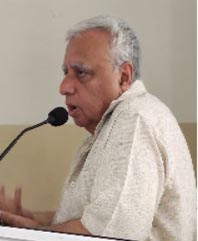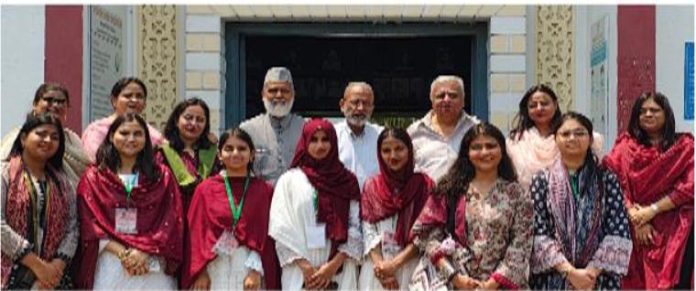Aligarh: The Women’s College History Study Circle (WCHSC), Aligarh Muslim University, organised a two-day history fest, Historia, at the Women’s College premises, to develop in students a deeper engagement with historical inquiry and critical perspectives on gender and society.

The fest began with an inaugural lecture by Prof. Farhat Hasan from the University of Delhi on the theme “Rethinking Gender and Agency in Indian History: A Historiographical Critique.” He examined how traditional historiography has often portrayed women as passive figures, in contrast to the dominant and privileged positioning of men. He highlighted the limitations of such frameworks and reflected on the challenges faced by Indian historians in addressing gender and agency, especially in comparison to Western scholarship.
The academic sessions were organised under three thematic categories that brought forth a wide range of student research and perspectives.
Under Category 1, “The Politics of Language and Identity Formation,” Yogita Varshney and Zoya Umar presented a paper titled “Education, Agency, and Utopia: A Cross-Cultural Feminist Perspective in the Works of Rokeya Sakhawat Hossain and Charlotte Perkins Gilman.” Abeer Fatima and Khadeeja explored the “Intersection of Gender, Identity, and Language in the Light of Pygmalion.” Rahat Ul Aien presented her research titled “Chudails, Babus, and the Ghosts of Patriarchy.”
Under Category 2, “Colonialism, Patriarchy and Indigenous Gender Systems,” Mehar Ahmad delivered a paper on “Subverting Patriarchy: Warrior Queens and Women Who Wielded Power in Indian History,” while Sayyeda Sultan spoke on “Impact of Colonialism on Indigenous Gender Systems: An Archaeological Perspective.” Sarah Samdani presented “From Matriliny to Patriarchy: Colonialism and the Nairs.”
Under Category 3, “Exploring Gender in Public/Private Spaces,” Sheeza Shoeb presented “Constructing Gender: The Interplay of Media, Art, and Identity,” and Aliya Akbar, along with Sana Jahangir, jointly presented their work titled “Exploring Power, Safety, and Recognition.”
The sessions explored topics such as feminist interpretations in literature, intersections of gender and language, representations of patriarchy in folklore, colonial impacts on indigenous gender systems, and the role of media and public spaces in constructing gendered identities.
In an extempore competition, Sarah Samdani won the first prize, while the second prize was jointly given to Naaz Khan and Yusra Haseeb. Sameera Tasneem secured the third prize.
The fest concluded with closing remarks by Zunaira Habib Alvi, President of WCHSC. The event witnessed active participation from students and faculty across departments and was appreciated by the Principal, Prof. Masud A. Alavi, and faculty members Prof. Shadab Bano, Dr. Arshia Shafqat, Dr. Farah S. Abidin, Dr. Shivangini Tandon, Dr. Lucky Khan, and Dr. Zafar Minhaj for promoting academic dialogue on gender and history.




